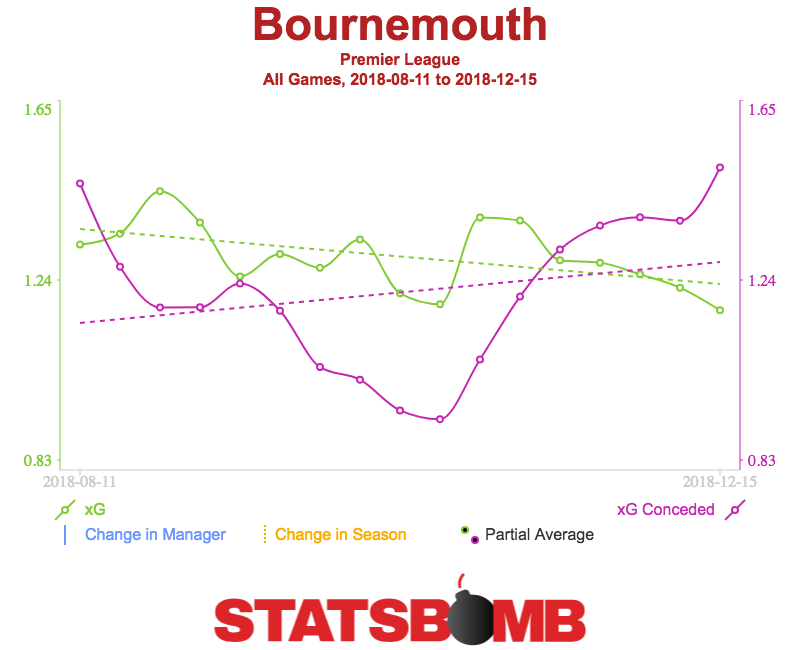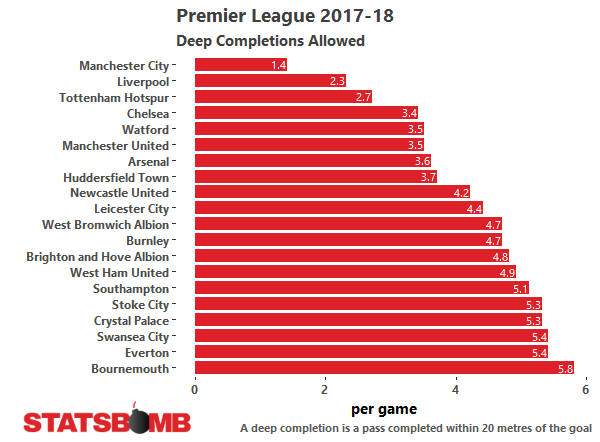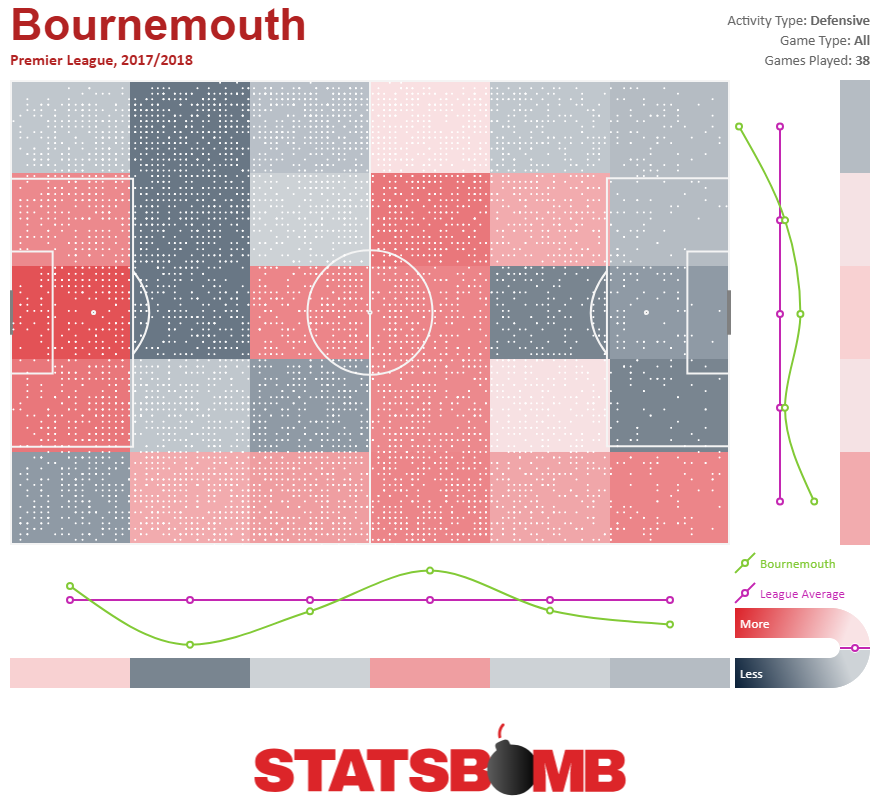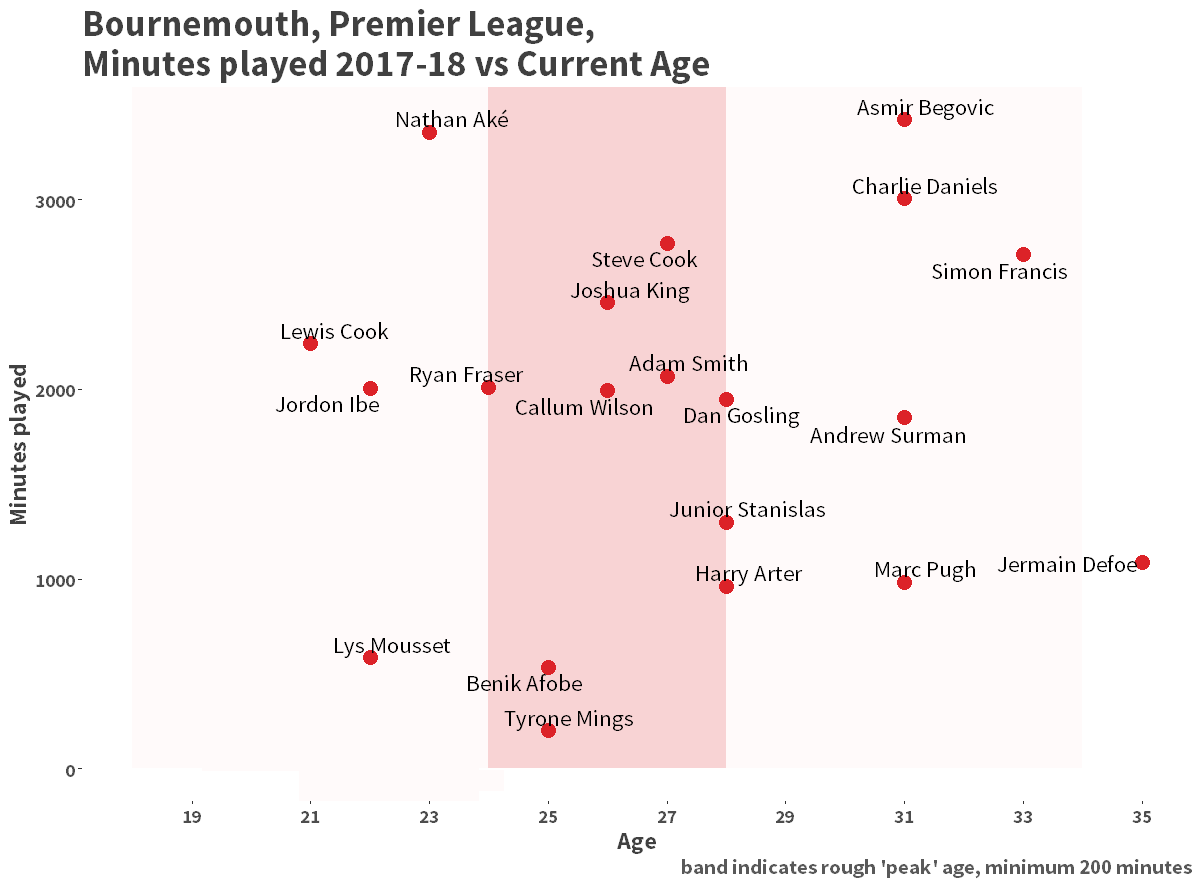Three consecutive seasons in the Premier League is a significant achievement for Eddie Howe and his Bournemouth team. They are still a comparatively small club; their stadium is significantly smaller than any other in the division and their wage outlay is consistently among the lowest in the league. It’s also impressive that their run in the division has been achieved without defaulting to an ultra defensive style of football, a trait so common in their direct peers, and they have managed to be fairly consistent for points with 42, 46 and 44. However, last season’s haul of 44 points concealed what was a grinding season, characterised by just four wins in the first half and boosted by a further two wins in their last two games of the season which landed them right at their par. They scarcely dallied with relegation, but for long spells didn’t perform particularly well. This team may have found a way to stay clear of real trouble so far but they remain within range; a down season could see them right in the midst of a relegation battle. Their 2017-18 metrics represent a warning in that direction too with only a mid-season run seeing them approach par: 
Metrics
Via xG, Bournemouth ranked 16th in the Premier League last season which landed them somewhere between now Championship sides West Brom and Stoke. The difference being their actual goal difference of -16 was two ahead of expectation while their now departed rivals landed themselves ten and 13 goals behind theirs. This isn’t definitively scathing towards Bournemouth’s capabilities, but improvement towards a stronger base would be the best way to contribute towards ensuring future safety. The thing is, for now, though admirably non-defensive, Bournemouth’s style likely contributes heavily to their inadequate metrics. For example take their defence:  It’s really easy to complete passes close to Bournemouth’s goal. Why might that be?
It’s really easy to complete passes close to Bournemouth’s goal. Why might that be?  ...because Bournemouth’s volume of defensive activity in the band ahead of the box is well below league average. Teams can get through Bournemouth's midfield and enact play in the deepest zones. As such Bournemouth put in an above average volume of last ditch defending, but ahead of that their midfield was porous. This chart also tells us more about the way Bournemouth deploy their defensive resources higher up the pitch. Joshua King, Callum Wilson and Jermain Defoe all ranked in the top 25 for the division for volume of opposition half pressure events--which we can see represented in the red segments ahead of the halfway line. It's just what takes place in between doesn't quite pass muster. Bournemouth can attack looking like an above average Premier League team, but scarcely look anything but below average at the back. While King moved his position out of the centre somewhat and understandably saw his goal totals reduce having come down from his 2016-17 finishing bender (but that's another story...), Wilson and Defoe tended to operate as the main striker, and saw genuine congruence in their metrics. Wilson slightly edged expected numbers while Defoe edged reality. It's curious that Bournemouth felt the need to back up Wilson with such a similar type in Defoe (or vice versa) for while they may have a willingness to run and press, each of their overall game involvement on the ball is severely limited. This means when you're up against it against a decent side and struggling to retain the ball, having a guy complete fewer than ten passes is far from optimal. Defoe, who turns 36 in October, retains another two years on his contract and after featuring most heavily before Christmas, while Bournemouth struggled, suffered an injury and only saw sporadic minutes thereafter. Failure to add an alternative goalscorer this window may well prove to be an oversight. One thing that changed last season was Bournemouth’s commitment to their formation. In their first two seasons in the Premier League, Eddie Howe kept fairly strictly to a back four, while varying the set-up ahead of that. During 2017-18 he implemented--at times-- the fashionable three centre back base. The typical Bournemouth 4-4-2/4-4-1-1 still won out as the most reliable choice, especially at home, while the three centre backs were fairly often wheeled out for games against the top six. However, it’s tough to see an outright pattern in the way the team chopped and changed between formations, and the reality of their underlying metrics suggests that these apparently erratic choices did not create any greater stability, for all that results turned out broadly the same as before. There are positives too. It was clear on a number of occasions last season that work had been done on attacking set
...because Bournemouth’s volume of defensive activity in the band ahead of the box is well below league average. Teams can get through Bournemouth's midfield and enact play in the deepest zones. As such Bournemouth put in an above average volume of last ditch defending, but ahead of that their midfield was porous. This chart also tells us more about the way Bournemouth deploy their defensive resources higher up the pitch. Joshua King, Callum Wilson and Jermain Defoe all ranked in the top 25 for the division for volume of opposition half pressure events--which we can see represented in the red segments ahead of the halfway line. It's just what takes place in between doesn't quite pass muster. Bournemouth can attack looking like an above average Premier League team, but scarcely look anything but below average at the back. While King moved his position out of the centre somewhat and understandably saw his goal totals reduce having come down from his 2016-17 finishing bender (but that's another story...), Wilson and Defoe tended to operate as the main striker, and saw genuine congruence in their metrics. Wilson slightly edged expected numbers while Defoe edged reality. It's curious that Bournemouth felt the need to back up Wilson with such a similar type in Defoe (or vice versa) for while they may have a willingness to run and press, each of their overall game involvement on the ball is severely limited. This means when you're up against it against a decent side and struggling to retain the ball, having a guy complete fewer than ten passes is far from optimal. Defoe, who turns 36 in October, retains another two years on his contract and after featuring most heavily before Christmas, while Bournemouth struggled, suffered an injury and only saw sporadic minutes thereafter. Failure to add an alternative goalscorer this window may well prove to be an oversight. One thing that changed last season was Bournemouth’s commitment to their formation. In their first two seasons in the Premier League, Eddie Howe kept fairly strictly to a back four, while varying the set-up ahead of that. During 2017-18 he implemented--at times-- the fashionable three centre back base. The typical Bournemouth 4-4-2/4-4-1-1 still won out as the most reliable choice, especially at home, while the three centre backs were fairly often wheeled out for games against the top six. However, it’s tough to see an outright pattern in the way the team chopped and changed between formations, and the reality of their underlying metrics suggests that these apparently erratic choices did not create any greater stability, for all that results turned out broadly the same as before. There are positives too. It was clear on a number of occasions last season that work had been done on attacking set pieces plays from which they had some success. Also in Lewis Cook and Jordon Ibe they have one young player who has significant potential and another who perhaps started to finally realise some of his own.
Transfers/Squad
Over the years, Bournemouth have had a curious reluctance to shop expansively and dive into the non-British based market. They started last season with only Ryan Fraser (who is Scottish and came through at Aberdeen), and their two reserve goalkeepers Artur Boruc (who first played on these shores in 2005 for Celtic) and Adam Federici (Australian, joined Wolves in 2003) as part of their over-21 first team squad that weren’t technically homegrown. Prior to this summer the only player they had signed in recent seasons without either a British passport or extensive links to the country was Lys Mousset, a talented attacker, who is still just 22 years old, but has failed to really nail down a regular first team slot since arriving from Le Havre in summer 2016. This general trend looked to be continuing when the highly touted young Welshman David Brooks joined from Sheffield United for around £10million this summer, but was surprisingly abandoned ahead of the signing of 25 year old Spanish full back David Rico for a similar fee from CD Leganés. The jury’s out as to whether Rico specifically has the quality to thrive in the Premier League but it is to be hoped that Bournemouth can be a little braver with their recruitment as time goes by and understand that there’s a whole world of players out there who may well be able to improve them, and not just to limit themselves to a majority of intra-league moves. There is also now talk of a move for Colombian midfielder Jefferson Lerma again possibly arriving from Spain and this time Levante. This move appears logical stylistically, as with Bournemouth often being quite open, a defensively stout midfielder could be the key to shoring things up. Again whether he has the quality to succeed in the Premier League remains to be seen--the reported £25million is a significant fee, and he might also want to chill out a bit; 16 bookings last season was quite some going. So we have seen a slight move away from their traditional strategy. It’s possible that the dynamic of the squad has been helped by a lack of language barriers, or that it perceived as a benefit to keep a culturally tighter knit group, but the modern Premier League is plenty wealthy enough to enact methods of overcoming any concerns in this direction, and the pros more than likely outweigh any cons. The squad is an interesting blend of ages that probably tends a little too far towards the older side, so it's enouraging that the new players have been 25 and under: 
Projection
In the "battle of the 14" that makes up the rest of the Premier League, bookmakers place Bournemouth almost dead centre, while Sporting Index's spread's place them within a win of seven teams ranging from 11th to 18th. Although a wide range, that's probably a fair representation of potential outcomes for the south coast side. It's tough to imagine them being anything different to what we have seen before, and having stayed up three times in a row, it will be hard to convince them that they might need to do anything different. Last season's metrics were a significant warning though. It is always a risk if you are one of the weaker teams in the league, for sometimes a handful of results don't fall your way and you find your season looking like West Brom's and wondering how you got into the mess you're in. Bournemouth have started slowly in the past before rallying in mid season but with the wider perception that this season's Premier League could be slightly better, with Fulham and Wolves coming up and looking solid bets to stay up, the battle at the bottom may just need a little extra to avoid being sucked in. That's not to be unnecessarily negative, and the stability in management and the team may well ameliorate against some of the potential downside, but we have yet to see a solid Bournemouth in this league--they will always ship goals. If that's inevitable, then they might need to hope that Jordon Ibe kicks on from a promising 2017-18 and their goalscorers can hit a warm streak. The deal remains the same: survival first, then hope for more.
Thank you for reading. More information about StatsBomb, and the rest of our season previews can be found here.